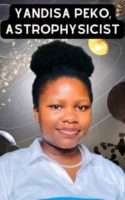Get ready to swoon over Yandisa Peko, who set Twitter on fire with her jaw-dropping graduation photo and an oh-so-cool caption that read, “UCT Astrophysics and Science Space graduate.”
We may not all be astrophysicists, but one thing is crystal clear: this field demands some serious brainpower, especially when it comes to subjects like math and physics. Yandisa’s tweet racked up a whopping eight thousand likes and a flood of comments, and let me tell you, some of them were pure gold. My favourites included gems like, “You guys are ridiculously smart. I’m in awe!” and “Wait, I thought this stuff only happened in movies.”
Intrigued by Yandisa’s stellar achievement, I caught up with the brilliant mind from the Eastern Cape to get the scoop on what it takes to study the stars and everything in between. Brace yourselves, folks!
Could you share with us some insights about your background and upbringing? We’d love to get to know you better!
I was born and bred in the Eastern Cape in a small town called Nqamakwe. I have attended public schools, both primary and high schools. I was and still am an introvert. I have enjoyed school acting in school plays.
What is Astrophysics about and how difficult is the degree?
Astrophysics is the science that deals with physical processes in the universe and the applications of physics theories to describe astronomical observations. The physics and mathematics is definitely challenging but I decided to specialise in this particular study during my second year.
What were the requirements to get into the degree programme?
You need to obtain level 5-6 for physics and maths (between 60 and 70%) to get into the undergraduate degree and an average of 65% or more to get into the honours program. Most students apply for the qualification without realising that it’s an academic degree rather than a professional one and so trying to find a job with just an undergraduate degree is difficult.
Why do you think it’s important to have young black women like yourself represented in STEM fields?
It’s important to challenge biases and to demonstrate that people deserve a chance to showcase their abilities, regardless of their race, background or age.
Can you describe the current state of astrophysics research in South Africa, and what role do you see it playing on a global scale?
The current state is that South Africa is producing more diverse researchers and more sophisticated research facilities. As for me, I see myself working in scientific communication, connecting science and society. Grant application processes need to become easier so more young people can pursue research in this field. There currently aren’t enough funding opportunities either.
Lastly, what message would you like to convey to the general public about the importance of astrophysics research and its potential impact on our understanding of the universe?
It is important to study the universe and how it works because it can benefit us in our daily lives. For example, smartphones and airport security scanners are the legacy of astronomy so investing in its research is definitely not in vain.
The global astrophysics community is like a massive cosmic family, with approximately ten thousand professionals spread across the globe. From the United States to the United Kingdom and Australia, these brilliant minds are making waves in the field.
But hey, let’s not forget about South Africa’s own cosmic legacy! With its incredible climate and ideal location, this country is a celestial wonderland. Just take a peek at the Southern African Large Telescope (SALT) – the largest optical telescope in the Southern Hemisphere. It’s like something out of a sci-fi movie! SALT has the power to capture those mesmerizingly faint stars, galaxies, and quasars that are hidden from our naked eyes. If you’re eager to dive deeper into this mind-expanding field and embark on your own celestial journey, look no further than this link: https://www.gostudy.net/occupation/astrophysicist. Brace yourself for an astronomical adventure!
***
Tell us: How can we ensure that more young people, regardless of their background, have access to opportunities to pursue research in astrophysics and other STEM fields?
Read more here to learn about a young scientist.


